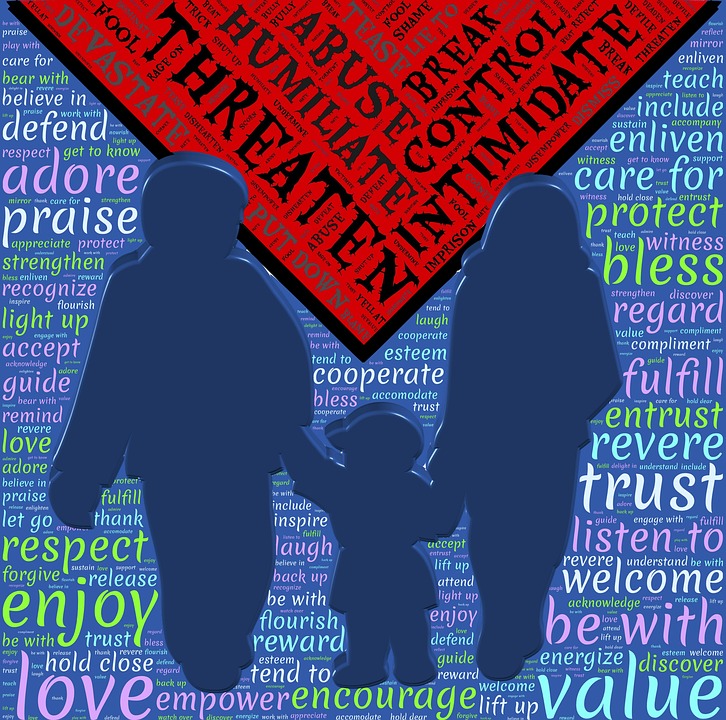Emotional abuse in a relationship and why it goes on?

Emotional abuse in a relationship is defined as a set of behaviours and actions that are used to establish and maintain power and control in a relationship, which could be any of the following – more often than not – yelling, screaming, insults, put downs, criticism, bad/hurtful language, calling names, emotional blackmail, threats of violence, threats to leave, threats to take away the children, silent treatment, withdrawal of affection, financial control, control of the other supporting relations, excessive suspicion/ checking etc. Primarily the intent is to control the other partner and make them do what the abuser wants them to do.
The important feature is that this happens repeatedly and is not a one off behavior and it gradually damages the other person’s self esteem, confidence, self worth and a sense of identity. It could make them feel insecure, afraid, anxious, can lead to depression and other psychological damages.
The abusive partner might have had an abusive childhood, might have had abusive environment in their childhood, might have learnt that their abusive behavior makes them feel powerful and in control of the situation and people around. No matter what the underlying reason for the abusive behavior, the abusive partner is an adult and would need to take responsibility for that behavior, no matter how much they might feel provoked.
Emotional abuse can be as severe and damaging as physical abuse. Though it doesn’t leave physical scars, it does leave emotional and psychological scars on the abused.
Now what are some of the reasons why the other person stays in the relationship and allows the emotional abuse to continue?
- The abused partner might feel that they have nobody else and nowhere else to go outside the relationship. They might feel powerless in the relationship too.
- Might be financially dependent on the abuser.
- Might have a low self esteem which gets compounded and gets even more damaged by the emotional abuse, that they can’t even think that they can do anything about it.
- Might believe that their partner has a right to treat them that way. Or may believe that this is how families are, based on their own childhood experiences.
- Might have had childhood trauma perhaps with one or both of their parents who were abusive towards them.
- Might believe that keeping the family intact would perhaps be the best for the children, to not have a broken family.
- Over a period of time, being in the cycle of abuse, they might have started believing that they are responsible for everything abusive that their partner does. They may believe in something like- “If I had not said/done something, then my partner wouldn’t have gotten angry and gotten into the abusive behaviour”.
- Might use the abuse to get the sympathy of other people in the family.
- Might be co-dependent, I believe that they are the only one who can help the abusive partner and believe that without them their abusive partner will not be able to survive.
- Might fear the social stigma of separation, being alone, if there are children, parenting them alone etc.
If you find yourself in an abusive relationship, where you are being abused, the first step is to recognize it and the second step is to ask for support or help, for you to be able to handle it appropriately.
Remember – Children who are being brought up in abusive environment either may get abused themselves, may become abusive themselves in the future, or may end up enduring abuse in their future relationships.
An abusive environment cannot be a healthy environment for the couple or for the family or for the children.
Counselling can possibly help both partners address the abusive behavior and also address any other underlying relationship issues as well, depending on the nature, severity of the abuse, the abusive partner’s motivation level to change the abusive behaviors. The abusive partner needs to take responsibility for the abusive behavior, commit to make real-on the ground changes in their thoughts, beliefs and behaviors to make a lasting change.
Depending on the nature and severity of abuse, the counsellor will recommend if couple therapy is amenable for the couple or to start with individual therapy.
Even if the abusive partner is not willing to seek help, the other partner can learn to keep themselves safe emotionally, stand up for themselves in a safe manner and take decisions accordingly regarding their life, family and relationship.
About the Author:
Kala Balasubramanian is certified Counselling Psychologist/Psychotherapist with a Masters in Counselling and Psychotherapy, Diplomas in Counselling and has further certifications specializing in couple/marriage/relationship counselling and family counselling. She provides a supportive, understanding, professional and confidential environment to work with clients – Individuals and Couples explore their emotions, help them understand and manage their challenges, relationships and stress better.
